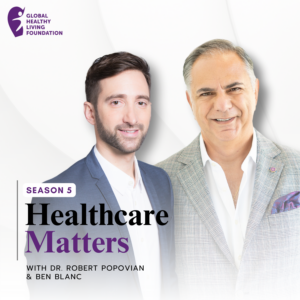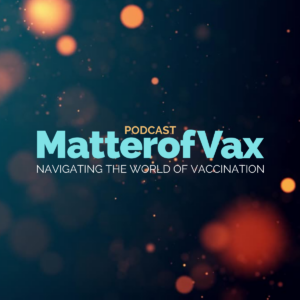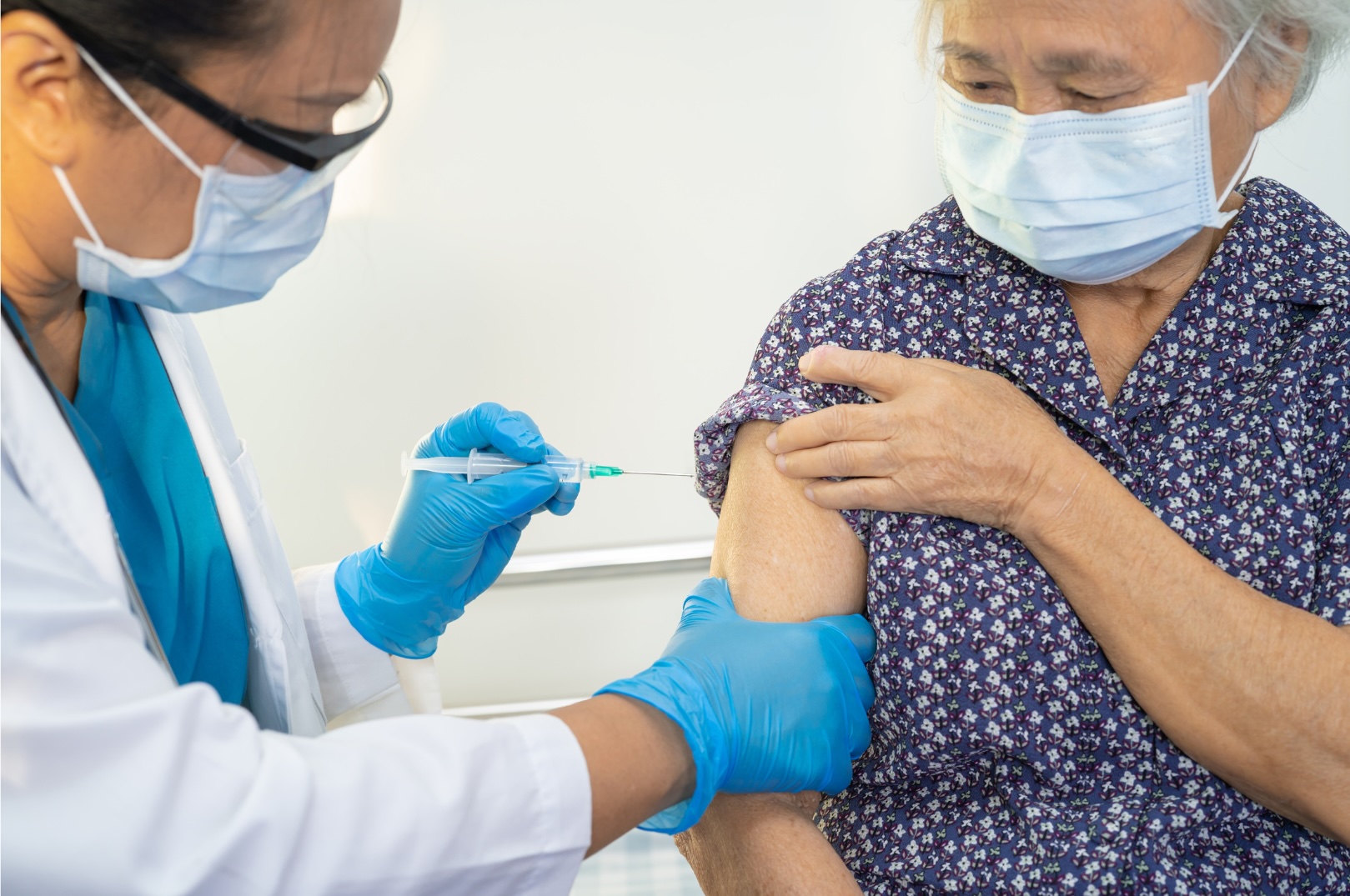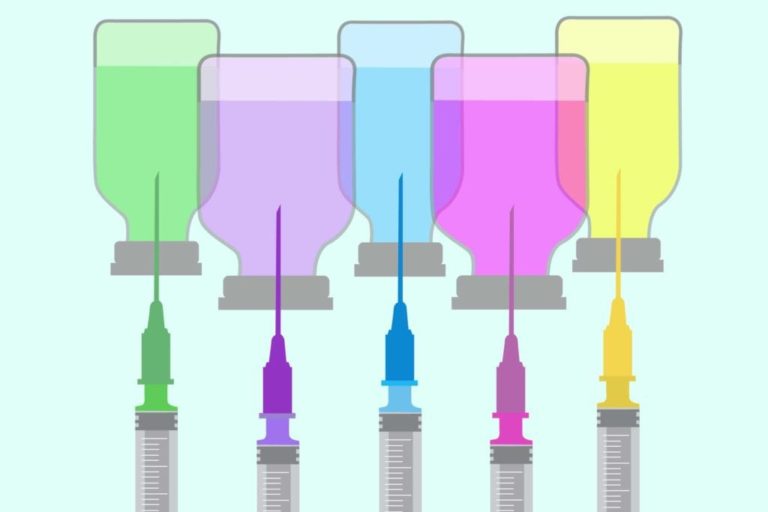Enhancing Adult Vaccine Uptake: Challenges in Shared Clinical Decision Making and Risk-Based Recommendations
Vaccine Resources
Vaccine Advocacy, Research, and Education

Friday, April 25th, 2025 — The Global Healthy Living Foundation (GHLF) delivered wide-reaching, multi-format coverage from the 2025 World Vaccine Congress in Washington, D.C. The coverage featured interviews with leading experts in vaccine policy and public health, as well as a special video podcast episode recorded onsite that explored the current landscape of adult immunization policy, funding threats to vaccine infrastructure, misinformation challenges, and what’s next for vaccine innovation.
To watch the full video coverage, click here.
Friday, March 28th, 2025 — The Global Healthy Living Foundation (GHLF) released a new report, “Enhancing Adult Vaccine Uptake: Challenges in Shared Clinical Decision Making and Risk-Based Recommendations,” investigating how certain CDC Advisory Committee on Immunization Practices (ACIP) vaccine policies—particularly Shared Clinical Decision Making (SCDM) and risk-based recommendations—are contributing to lower vaccination rates among adults, especially in underserved communities.
To read the full report, click here.
Vaccines have been a remarkable achievement in the fields of medicine and public health, effectively safeguarding countless lives for well over two centuries. However, recent waves of misinformation have led to unwarranted concerns, particularly among parents.
GHLF is dedicated to promoting accurate, evidence-based insights on vaccines and vaccine research. We consistently provide resources that highlight the importance of vaccines, including the COVID-19 vaccine. Additionally, we advocate for collaborative decision-making between patients and health care providers while creating content tailored to both patients and policymakers.

“We live in a health care system that is severely fractured. The onus is not on the patient to spend hours or weeks trying to get access to something they should be given. And then we talk about vaccine hesitancy. We have no right to talk about vaccine hesitancy when we make it so difficult at every step of the way for our patients to gain access to what they need.”
— Shilpa Venkatachalam, PhD, Director, Patient-Centered Research Operations and Ethical Oversight and President of GHLF North Africa
Whether you’re navigating the intricate landscape of COVID-19 vaccine information or aiming to comprehend the science behind vaccines and dispel common myths, our vaccine resources are tailored to address concerns, questions, and needs regarding vaccination.
It can be difficult to follow all the COVID-19 vaccine news and what it means for you — especially if you’re immunocompromised. Check out our coverage about the COVID-19 vaccine.
This resource discusses the importance of vaccines, presenting the facts and dispelling the myths to help address vaccine misinformation for global public health.

Your health is your most valuable asset, especially if you’re living with a chronic illness. One of the best ways to safeguard your well-being is by staying up to date with your vaccinations. Prioritize your health and ensure your vaccinations are current to protect yourself and your loved ones.
Regarding the COVID vaccines: The 2024–2025 formulations for COVID-19 vaccines approved or authorized in the United States have been updated to a monovalent vaccine based on the Omicron JN.1 lineage of SARS-CoV-2.
COVID-19 vaccination is recommended for everyone aged 6 months and older in the United States by the Centers for Disease Control and Prevention (CDC) for the prevention of COVID-19. There is currently no Food and Drug Administration (FDA) approved or authorized COVID-19 vaccine for children younger than 6 months of age.
- All adults ages 19 to 26 years should make sure they’re up to date on these vaccines:
- Chickenpox vaccine (varicella)
- COVID-19 vaccine
- Flu vaccine (influenza)
- Hepatitis B vaccine
- HPV vaccine (human papillomavirus)
- MMR vaccine (measles, mumps, and rubella)
- Tdap vaccine (Tetanus, diphtheria, and whooping cough) or Td (tetanus, diphtheria)
Source: https://www.cdc.gov/vaccines/adults/rec-vac/index.html
- All adults ages 27 to 49 years should make sure they’re up to date on these vaccines:
- COVID-19 vaccine
- Flu vaccine (influenza)
- Hepatitis B vaccine
- MMR vaccine (measles, mumps, and rubella)
- Tdap vaccine (Tetanus, diphtheria, and whooping cough) or Td (tetanus, diphtheria)
Source: https://www.cdc.gov/vaccines/adults/rec-vac/index.html
- All adults ages 50 to 64 years should make sure they’re up to date on these vaccines:
- COVID-19 vaccine
- Flu vaccine (influenza)
- Shingles vaccine (zoster)
- Tdap (tetanus, diphtheria, and whooping cough) or Td (tetanus and diphtheria)
- RSV (respiratory syncytial virus)
Source: https://www.cdc.gov/vaccines/adults/rec-vac/index.html
- As we get older, our immune systems tend to weaken, putting us at greater risk for certain diseases. All adults ages 65 and older should make sure they’re up to date on these vaccines:
- COVID-19 vaccine
- Flu vaccine (influenza)
- Pneumococcal vaccine
- Shingles vaccine (zoster)
- Tdap (tetanus, diphtheria, and whooping cough) or Td (tetanus and diphtheria)
- RSV (respiratory syncytial virus)
Source: https://www.cdc.gov/vaccines/adults/rec-vac/index.html
At GHLF, we understand that the only way to bring about change, whether it is with policymakers and legislative reforms or patients and their individual medical decisions, is to provide clear, consistent educational resources that help counter the large quantities of misinformation that are readily available online and on social media platforms.
Our data and research teams have published reports and studies regarding vaccination trends, expanding availability, and ensuring equitable access to vaccines that we believe should help inform policymakers that are discussing legislative changes to vaccine policy. GHLF also offers patient-centric, non-partisan content.
- Report: Global Healthy Living Foundation – Enhancing Adult Vaccine Uptake: Challenges in Shared Clinical Decision Making and Risk-Based Recommendations, GHLF Report. March 2025.
- Report: IQVIA Human Data Sciences and Global Healthy Living Foundation – Assessing the Impact of State Pharmacist Vaccination Authority on Vaccine Uptake in the U.S., IQVIA Report. February 2025.
- Report: Global Healthy Living Foundation – Challenges to Vaccine Access for High-Risk Chronic Disease Adults, GHLF Report. August 2024.
- Report: Global Healthy Living Foundation – Removing Barriers to Pharmacy Vaccination: A Path to Better Health and Lower Health Care Costs, GHLF Report. April 2024.
- Report: IQVIA Human Data Sciences and Global Healthy Living Foundation: Trends in Adult Vaccination in the U.S., IQVIA Report. February 2024.
- Report: Global Healthy Living Foundation – Challenges in Adult Vaccination: Policy Strategies for Sustaining Access and Supply, GHLF Report. May 2024.
- Michael Mandel, Robert Popovian, and Wayne Winegarden, Quantifying the Economic and Health Benefits from Rapid-Development COVID-19 Vaccines and Boosters. Progressive Policy Institute. January 4, 2024.
- Report: IQVIA Human Data Sciences and Global Healthy Living Foundation: Trends in Vaccine Administration in the United States, IQVIA Report. January 2023.
- Robert Popovian, Wayne Winegarden, Esteban Rivera, and Kelly Gavigan, Accessibility of Adult Immunization in Pharmacies Compared to Physician Offices in Low-Income Communities. Journal of American Pharmacists Association. March 30, 2022.
- Popovian, Robert, How to Ensure Equitable Access to Vaccines, Volume 11(6), December 2020, Journal of Vaccines and Vaccination.
- Popovian, Robert and Hering, Dave, Enhance and Expand Access to Vaccines, Volume S5, November 2020, Journal of Vaccines and Vaccination.
- Shilpa Venkatachalam, Kelly Gavigan, Shubhasree Banerjee, Jennifer Gordon, Lisa Emrich, Hope Sullivan, Ashira Blazer, Brittany Banbury, Kimberly Weaver, Laura Stradford, Vandana Dronadula, Angela Degrassi, Peter Merkel, Dianne Shaw, Kalen Larsen, Jeffrey R. Curtis, Robert McBurney, Michael Kappelman, Michael George, Ben Nowell, Engaging Multistakeholder Perspectives to Identify Patient‐Centered Research Priorities Regarding Vaccine Uptake Among Adults With Autoimmune Conditions
- Emily Holladay, Amy Mudano, Fenglong Xie, Patrick Stewart, Lesley Jackson, Maria Danila, Kelly Gavigan, Ben Nowell, Shilpa Venkatachalam, Jeffrey Curtis, COVID-19 Vaccine Uptake, Hesitancy, and Flare in a Large Rheumatology Practice Network

“Vaccines are one of the most cost-effective interventions in health care and form the cornerstone of patient-focused public health programs worldwide. At GHLF, we’re dedicated to conducting patient-centered research to understand and evaluate the impact of state and federal policies on immunization access.”
— Robert Popovian, PharmD, MS, Chief Science Policy Officer, GHLF
On the policy side, GHLF supports laws that restrict the ability for people to claim non-medical exemptions to vaccine mandates. We understand and respect different philosophical and religious beliefs, but we believe that in order to maximize vaccination success and immunity for the public as a whole — and especially for those with chronic illness and autoimmune disease — vaccine exemptions should be permitted only for valid medical reasons. In collaboration with the American Academy of Pediatrics, and other concerned groups, we address concerns over disrupted early childhood vaccine schedules due to the COVID-19 pandemic and emphasize the importance of “community immunity.”
In addition, our work with coalitions like the American Disease Prevention Coalition (ADPC) has allowed us to advocate for laws that would increase pharmacists’ ability to provide vaccinations, thus increasing the amount of locations where patients can receive them and cutting costs.
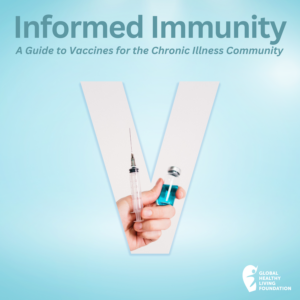
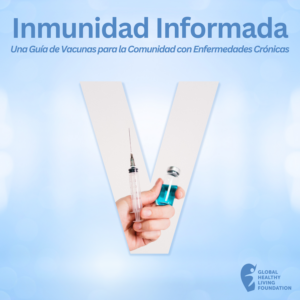
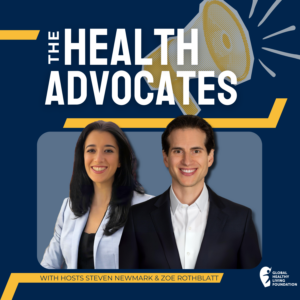
Watch our latest webinar: “Making the Most of Your Vaccines”
More Webinars
Nearly 9 out of 10 patients with a confirmed positive COVID-19 test and
chronic conditions (88.5%) were aware of oral antivirals, but only 56% were
prescribed one after testing positive
In April 2025, the Global Healthy Living Foundation launched the COVID-19 Antiviral Access Survey to better understand the real-world barriers patients face in accessing COVID-19 oral antiviral treatments. This report titled “Awareness and Access to COVID-19 Oral Antiviral Treatments Among U.S. Patients with Chronic Conditions,” highlights the awareness gaps, logistical challenges, and provider- and policy-level barriers that continue to prevent vulnerable patients from receiving timely treatment.
Report author: Dr. Robert Popovian, PharmD, MS
Survey authors: Dr. Robert Popovian, PharmD, MS; Shilpa Venkatachalam, PhD, MPH; Ambika Vartak, MPH; Ian Carroll, MS; Ben Blanc, MS
Report Design and Analysis: Erik Stone
To access and download the full report (PDF), click the button below:
Vaccines have been in use as a tool for physicians to control the spread of disease since 1796 when the first vaccine was used to combat Cowpox. Today, there are vaccines available to treat 26 different communicable diseases in the United States, leading to millions of vaccines being administered across the world.

Here are a few facts about the creation of some of the most important vaccines in public health history. Expand the menus below.
- The smallpox vaccine was one of the first to be used worldwide in large enough numbers to begin to control the disease.
- It is made from a virus called Vaccina, which is related to smallpox but less deadly. The smallpox vaccine DOES NOT contain the smallpox virus and cannot give someone smallpox.
- Historically, it has been effective at preventing smallpox in 95 percent of those vaccinated.
- Routine vaccination for smallpox in the U.S. stopped in 1972 after it was declared eradicated in the U.S.
- For more information on the history of the smallpox vaccine, please visit our Matter of Vax Episode Page on Smallpox.
- The polio vaccine was created in the early 1950s by U.S. physician Jonas Salk.
- The vaccine is still given today, with infants receiving three doses at 2, 4, and 6 months of age, with booster doses given again at ages 4 and 6.
- Polio was eliminated in the Americas by 1994 and the Western Pacific by 2000, with other areas of the world eliminating it or greatly restricting it by 2021.
- For more information on the history of the Polio vaccine, please visit our Matter of Vax Episode Page on Polio
- The first effective vaccine for typhoid was introduced for military use in 1896 and given to soldiers at war, who were more likely to be killed by typhoid than combat at that time.
- There are two types of vaccines for typhoid, Inactivated and live, with each having its own benefits and administration schedule. Patients should work with their health care provider to decide which one is best for them.
- Routine typhoid vaccine is not recommended in the U.S., but it is highly recommended for people traveling to counties where it is a risk.
- For more information on the history of the Polio vaccine, please visit our Matter of Vax Episode Page on Typhoid
- Opinion Editorial: Pharmacists’ Crucial Role in Getting Vaccines into Arms. Governing, April 16, 2024.
- Opinion Editorial: Pharmacists are the solution for the lagging vaccination rates of seniors in the U.S. The Medium, June 2023.
- Opinion Editorial: Getting vaccinated at pharmacies works: It could soon disappear. The Hill, January 2023, Kevin Ban and Robert Popovian.
- Opinion Editorial: Pharmacist-Administered Vaccinations Should Be Here to Stay, May 2022, Governing.
- Opinion Editorial: We Need to Avert the Next Public Health Disaster, Feb 2022, Inside Sources.
- Opinion Editorial: Vaccines are the future of health care, September 2021, The Hill.
- Opinion Editorial: Waiving Covid-19 Vaccine Patents Is a Bad Idea and Sets a Dangerous Precedent, Town Hall, June 2021.
- Opinion Editorial: The pandemic will end at your local pharmacy — if we let it. March 2021, Washington Examiner.
- Opinion Editorial: We Should Not Lose Sight of the Upcoming Flu Season, September 2021.
- Opinion Editorial: We Can Address Vaccine Equity, April 2021.
SUBSCRIBE TO GHLF
GHLF partners closely with a range of coalitions and organizations, amplifying the effectiveness of our vaccine advocacy, research, and education efforts.


Was this article helpful?
YesNo

